
The transportation industry is on the cusp of a major transformation, with the rise of artificial intelligence (AI) and autonomous vehicles. In this article, we'll explore the potential benefits and challenges of this new technology and how it will shape the future of transportation.
The Benefits of AI and Autonomous Vehicles
There are many potential benefits to using AI and autonomous vehicles in the transportation industry, including:
- Improved Safety
Autonomous vehicles have the potential to reduce the number of accidents on the road by eliminating human error. AI can also be used to analyze traffic data and improve the efficiency of transportation systems, reducing congestion and improving safety.
- Increased Efficiency
Autonomous vehicles can travel more efficiently than human drivers, reducing travel time and fuel consumption. AI can also be used to optimize transportation systems, reducing congestion and improving overall efficiency.
- Improved Accessibility
Autonomous vehicles can provide transportation for people who are unable to drive, such as the elderly or those with disabilities. This can improve accessibility and quality of life for many people.
The Challenges of AI and Autonomous Vehicles
While there are many potential benefits to using AI and autonomous vehicles in transportation, there are also several challenges and concerns to consider, including:
- Data Privacy and Security
AI and autonomous vehicles rely on large amounts of data to function effectively. It's important to ensure that this data is kept secure and that individuals have control over how their data is used.
- Liability and Legal Issues
There are several legal and liability issues to consider with autonomous vehicles. For example, who is responsible if an autonomous vehicle is involved in an accident?
- Job Displacement
As automation becomes more prevalent in the transportation industry, there is a risk that many jobs will be displaced. It's important to ensure that workers are retrained and reskilled to prepare them for the jobs of the future.
The Future of Transportation
The future of transportation is likely to be shaped by AI and autonomous vehicles. Here are a few ways that this technology is likely to impact transportation:
- Improved Public Transportation
AI can be used to optimize public transportation systems, reducing congestion and improving efficiency. Autonomous vehicles can also be used for public transportation, improving accessibility and reducing costs.
- Delivery Services
Autonomous vehicles and drones can be used for delivery services, reducing the need for human drivers and improving efficiency.
- Personal Transportation
Autonomous vehicles have the potential to revolutionize personal transportation, making it safer, more efficient, and more accessible for everyone.
Conclusion
The future of transportation is likely to be shaped by AI and autonomous vehicles. While there are many potential benefits to this technology, there are also several challenges and concerns to consider. As we continue to explore the potential of AI and autonomous vehicles in transportation, it's important to ensure that we use these technologies in a responsible and ethical manner, with a focus on improving the quality of life for everyone.